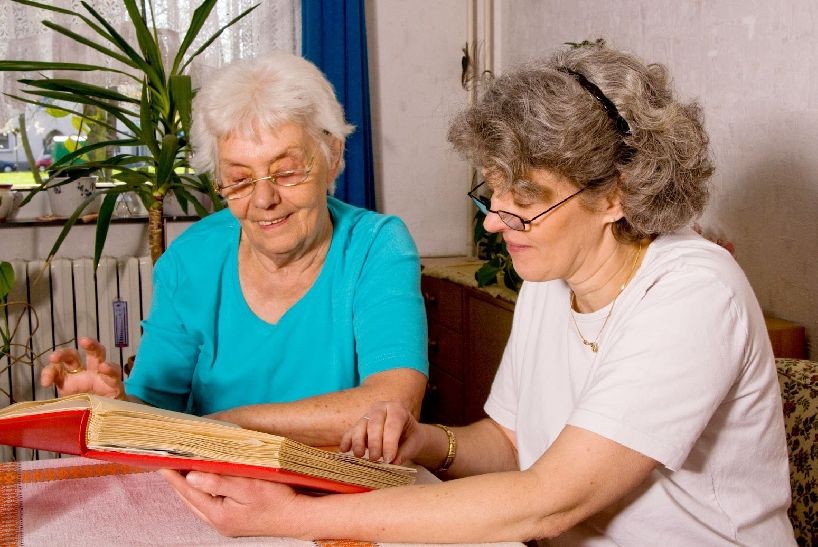Tips for supporting dementia patients
Specialist topics
Tips for supporting dementia patients
The number of people suffering from dementia in Switzerland is currently around 119,000 - and rising. To date, this disease is the most common reason why older people require care.

Around 40 percent of people with dementia continue to live at home, but coping with everyday life is becoming increasingly difficult. Sooner or later, they will need professional support, which Spitex can provide.
What should you do if you suspect that your relative may have dementia?

Your relative keeps misplacing their wallet, forgets their neighbor's name or often thinks about what they just wanted to say? This is not necessarily cause for concern, as memory performance declines with age. Blood flow to the brain is reduced, which leads to age-related deterioration. However, suspicion of dementia hardens when other symptoms are added, such as:
- Confusing terms
- Speaking incomplete sentences
- Disorientation in time and space
- Confusing familiar people
- Using the wrong objects for certain activities
- Uncertainty and fear of everyday things
If you notice such behavior in a relative, talk to other family members or close confidants about it. Have they noticed anything similar? If so, share your concerns with the relative concerned.
Keep the conversation calm and do not force anything on them. Ask them to visit their family doctor with you to talk about it. The doctor may be able to ease your worries. If he agrees with you, he will refer you to a specialist.
In every respect, you have done everything right by going to the doctor. Early detection is worth its weight in gold when it comes to dementia. The sooner treatment begins, the better the symptoms can be alleviated and the progression of the disease slowed down. Dementia patients can thus live independently for a particularly long time.
The next important step is to find out about possible support. For example, Spitex organizations provide valuable help in caring for dementia patients.
What requirements must Spitex fulfill to support dementia patients?
Dementia has countless faces. It is a collective term that encompasses more than 100 different clinical pictures that impair brain function. Spitex employees must be familiar with all the different ways in which dementia can manifest itself.
Due to the limitations in brain function, dementia patients have very different needs to cognitively healthy clients. Comprehensive knowledge of the complex disease and its effects is therefore essential when providing care.
Communication with dementia patients is often particularly difficult. Even if their cognitive abilities are limited, this in no way means that they no longer perceive interpersonal aspects. Even in advanced stages of the disease, patients can sense how the other person is feeling. They reflect the mood of the other person in their own behavior.
This is why not only the actions but also the facial expressions, gestures and tone of voice of the professionals are crucial. In nerve-wracking situations, it is not always easy to pay attention to all of these points. It is therefore essential that Spitex staff show a great deal of patience and understanding.
They must always remain calm. A friendly facial expression, a gentle tone of voice and eye contact can help calm dementia patients even in agitated situations.
Spitex as an important interface

As dementia manifests itself very individually, it is particularly important that all areas of care work together as closely as possible. Spitex, GP and hospital should always have the same level of knowledge, as the condition of dementia patients can change rapidly.
A central pooling of all information is therefore crucial in order to quickly adapt care and treatment plans to the new circumstances. This is the only way to achieve the best possible care for clients.
Spitex forms an important interface between inpatient and outpatient services. Due to their close cooperation with dementia patients, the specialist staff of a Spitex organization are able to recognize even the smallest changes.
If there are indications of incipient delirium or an impending infection, the specialists immediately contact the family doctor. They can intervene at an early stage and prevent complications and hospitalization. In this way, the acceleration of dementia-related deterioration can be slowed down or prevented. This in turn enables dementia patients to remain living in their own homes for longer.
What advantages does Spitex offer when caring for dementia patients?

It is well known that staying in familiar surroundings has a positive effect on the course of the disease. Changes in living space can quickly have a frightening effect, as people with dementia may not understand why they are moving. It is also not uncommon for them to have great difficulty finding their way around in their new environment, which causes further uncertainty.
The positive influence of familiar sights, smells and sounds should not be forgotten. They can revive memories that help dementia sufferers to forget less quickly.
The Spitex specialists also provide clients with support. They can rely on regular visits from a person who is familiar to them and only wants to do good.
The familiar daily routine that gave dementia sufferers support in the past often threatens to fall apart. With the help of Spitex, this can be maintained as far as possible. The familiarity and structure that these visits bring to everyday life have a positive effect on the progression of dementia.
What tips can Spitex give relatives of dementia patients?
Particularly in the early stages of dementia, it is often family members who take over the care of the person with dementia. Regularly seeing familiar faces is even an important aspect of slowing down cognitive decline.
However, there comes a point when the disease has progressed so far that professional support is needed. This is when the Spitex staff come into play. However, engaging them does not mean that relatives are now left out in the cold. The positive effect of regular visits from family members naturally remains.
However, it is important that they are also trained in dealing with dementia patients. Otherwise, the family will quickly become very stressed if the person with dementia is going through a difficult phase. At a certain point, they will no longer recognize their relatives. This may be the case temporarily or permanently.
This is incredibly difficult for relatives to experience and they frantically try to bring back memories of them. In their desperation, they quickly put the person with dementia under unintentional pressure. It goes without saying that such situations have anything but a positive effect on the patient's condition.
This is why Spitex specialists offer support not only to clients, but also to their relatives. They show them how to deal with their sick family member so that the situation remains as relaxed as possible for everyone.
Find the right Spitex for dementia patients with OPAN®
With our platform for online patient registration for Spitex services, we help you to find the right facility for your relative. With OPAN®, you are just a few clicks away from the Spitex that meets your relative's individual needs.
We will be happy to provide you with detailed information about our platform and answer all your questions. Just get in touch with us!
